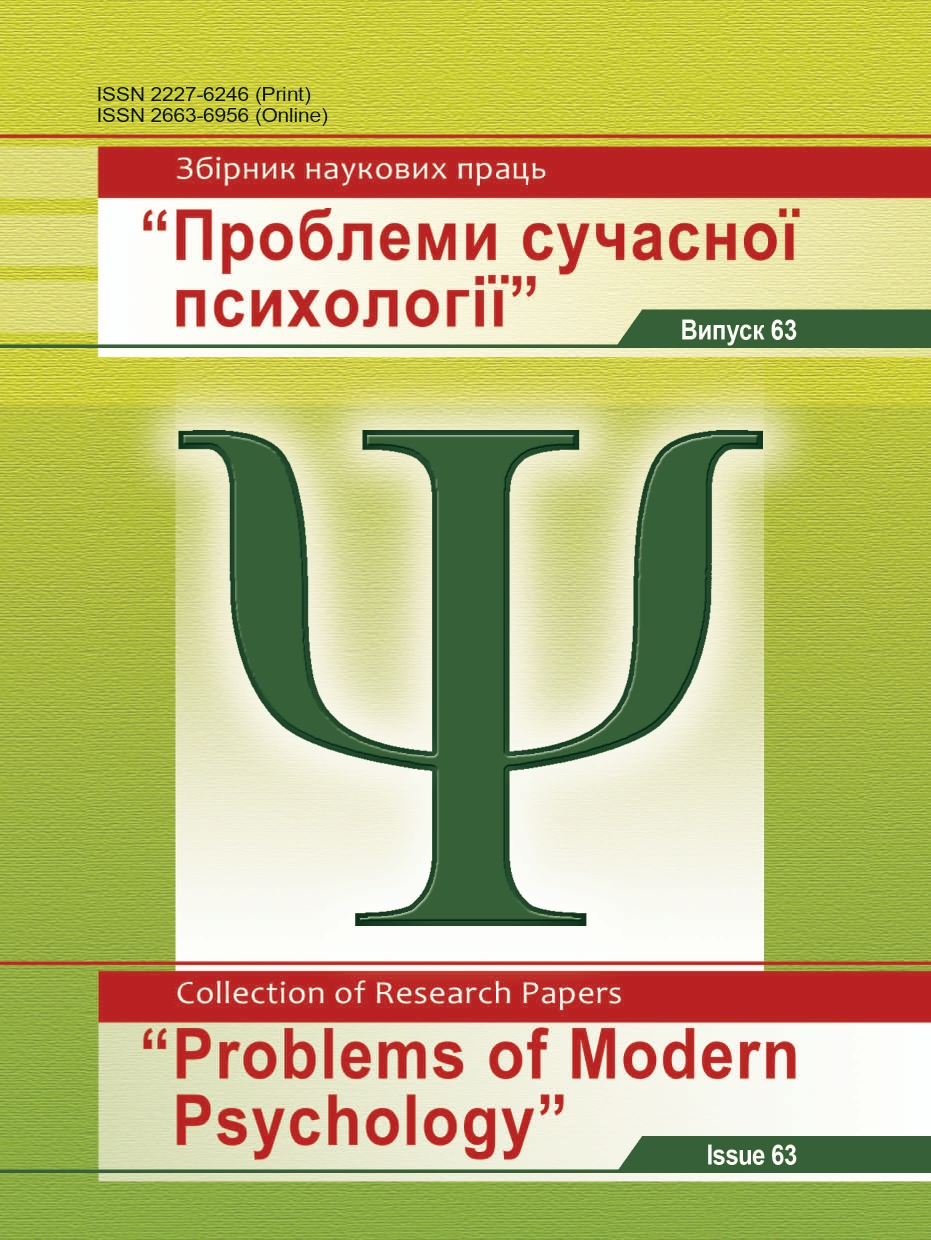The Psychology of the Formation of Adaptive Relationships between Parents and Children of Senior Age with Intellectual Disabilities in Ukrainian Society in the Conditions of Military Operations
DOI:
https://doi.org/10.32626/2227-6246.2024-63.90-112Keywords:
adaptive relationships, interpersonal relationships, intellectual disabilities, maternal deprivation, passive-defensive relationships, active-defensive relationships, aggression, emotional discomfort, conflictsAbstract
The purpose of this article is to study psychological characteristics and parents-children interpersonal relationships in the family with a child with intellectual disabilities.
Methods of the research. The following theoretical methods of the research were used to solve the tasks formulated in the article: a categorical method, structural and functional methods, the methods of the analysis, systematization, modeling, generalization. The empirical method is a pilot research.
The results of the research. Such personal characteristics, as aggression, infantilism, shyness (the result of disrupted relationships between a child and his/her parents) can be attributed to three levels of parent-child interpersonal relationships: Level I – the relationships between parents and a child are characterized as passive-defensive ones, children are in a state of hidden conflict, there is no possibility of establishing emotional intimacy; Level II – there is adaptive atmosphere of emotional incontinence in the family. Children adopt this style and treat their parents in a “mirror” way – it is active-defensive style. Children are confident that their requests and desires will not be satisfied. Accusations are responded to them with aggression. They do not know how to restrain emotional reactions; their behavior is dominated by excitability, conflicts and aggressiveness; Level III – there are the same family characteristics as in the second level, but children are noted to have a weak nervous system. As a result, in response to sharp influences from the side of their parents, physiological disorders arise such reactions, as tic, enuresis, stuttering. Typically, such a child is characterized by obedience, but the possibility of outbursts of aggression towards peers cannot be ruled out.
Conclusions. We showed, that the extreme variant of violations of the relationships between parents and children was “maternal deprivation”. This condition is characterized by severe psychological discomfort of the child, occurs in conditions of constant absence of the mother or severe rejection from the side of her attitude to a child. Both in theoretical and experimental studies which deal with the influence of the family situation on the formation of behavioral tendencies and personality traits of children, play the enormous role of the mother. So, in the situation of the absence of the mother or in the situation where the child saw her extremely rarely, the child felt emotional discomfort, cried more often, was stubborn and aggressive.
Downloads
Published
How to Cite
Issue
Section
License
Copyright (c) 2024 Kharchenko Nataliia

This work is licensed under a Creative Commons Attribution-NonCommercial 4.0 International License.
Copyright
The Editorial Board has the full right to publish original scientific papers containing results of theoretical and experimental research works which are not currently subject to review for publication in other scientific editions. The Author shall transfer to the editorial board of the Collection the right to spread the electronic version of the paper, as well as the electronic version of the paper translated into English (for papers originally submitted in Ukrainian and Russian) by all kinds of electronic means (placement at the official website of the Collection, electronic databases, repositories etc).
The Author of an article reserves the right to use materials of the paper, without approval with the editorial board and the founders of this Collection: a) partially or fully, for educational purposes; b) for writing own dissertation papers; c) for preparation of abstracts, conference reports and presentations.
The Author of an article can place electronic copies of the paper (including the final electronic version downloaded from the official website of the Collection) at:
- personal web resources of all Authors (websites, webpages, blogs etc.);
- web resources of the institutions where the Authors are employed (including electronic institutional repositories);
- non-profit public access web resources (for example, arXiv.org).
But in all cases, it is obligatory to have a bibliographic reference to the paper, or a hyperlink to its electronic copy placed at the official website of this Collection.






